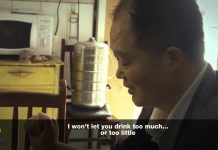Step into the captivating realm of “The Art of Squatting” as this documentary offers a contemporary perspective on this unconventional lifestyle in England. Set against the backdrop of the approaching Olympics and the newly passed law that criminalizes living in unused properties, the film sheds light on the diverse range of individuals who choose to live in squats and the profound impact these spaces have on society.
Part 1 of the documentary introduces viewers to an underground punk gig hosted in a squat, providing a glimpse into the vibrant subculture that flourishes within these alternative spaces. Meet the individuals who make these nights happen and delve into the history of squatting in the 1970s, uncovering the roots of this unique movement.
In Part 2, the film takes a deeper dive into the southern squat scene, featuring interviews with a prominent band that thrives within this community. Explore the oldest squat in England, where the residents open their arms to the public, fostering a sense of unity and solidarity. Hear from passionate campaign groups opposing the newly enacted law, and gain insights from local council representatives and housing associations.
Moreover, the documentary highlights the artistic side of squatting, showcasing an art exhibition featuring the works of individuals who have experienced homelessness. Witness the power of creativity and expression within these marginalized communities, as they find solace and meaning amidst challenging circumstances.
“The Art of Squatting” challenges conventional perceptions by presenting squatting as an art form in itself. Through intimate interviews, immersive footage, and thought-provoking narratives, the film invites viewers to question preconceived notions about property ownership, societal norms, and the role of alternative living spaces.
Prepare to be captivated by this contemporary exploration of squatting, as it confronts the impending changes and sheds light on the resilience, creativity, and communal spirit that thrive within these unconventional communities.

































